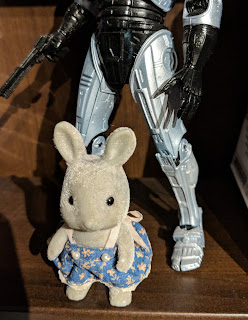The Forever War
The Forever War
Joe Haldeman, 1974
Hugo Award Winner - 1976
Premise: William Mandella is drafted into the first interstellar war. Time dilation and changing cultures make for an experience unlike, yet still akin to, all wars that came before.
 I remember liking this book much more when I first read it, 6-8 years back. Perhaps this is one book that is slightly hampered by knowing its place in history, or perhaps just time is marching on.
I remember liking this book much more when I first read it, 6-8 years back. Perhaps this is one book that is slightly hampered by knowing its place in history, or perhaps just time is marching on.The aspect of the book that I remembered liking the most - the effect of the time jumps on the characters - was still very strong. The war in question is a difficult, nearly impossible war to fight or to understand. Every time a ship goes through a jump, time dilation means that dozens or hundreds of years will pass for the ‘outside’ world. This means everything you rely on to give your side an edge in combat, including information or technological advantage or strategic goals may have changed by the next time you see normal space, and there’s no way for you to know.
Worse in some ways, every time the characters meet someone who has been to Earth more recently than they, it’s clearer that culture, conventional mores and even eventually language is moving on for the people living in ‘normal’ time, and the combat troops are further and further estranged from the homeland they fight for. Sound familiar?
It’s easy to get caught up in the particular implausibilities and contradictions of the future iterations of society, but this aspect of it may be best seen as a metaphor for how alien any civilian culture can seem for those returning from a war zone. More specifically, this is a Vietnam era book about the complete disconnect between civilian and military culture and the futility of endless war.
I do find it somewhat ironic (if not unexpected) that in a book about cultural change, it’s that aspect that is becoming further and further outdated by real-world cultural change. The first half or so I find awkward in that same way I’ve noticed in other ‘futuristic’ books from the late 60’s into the 70’s: the idea that free love and relatively indiscriminate coupling would become the norm among heterosexuals, while at the same time homosexuality would remain a fringe identity.
That didn’t exactly happen. See: the 80’s.
So the main character has a bit of homophobia characteristic of the actual year the book was written, not the time the book is ostensibly set. The book in a larger scope treats various sexual identities, the government controlling sexual desire, or no sexuality, as equally potential in the farther future.
Setting all that aside for the moment, however, Mandella’s journey as he tries to deal with the changes in culture, as he tries to just live through the war is interesting and very grounded, very human-feeling.
As a sci-fi metaphor about war and humanity, it’s a great read. As a speculative future, I kept raising an eyebrow here and there at those dated assumptions.
Averaging those feelings brings us to:
3 Stars - A Good Book
List of Hugo Winners



Comments
Post a Comment
FYI: Most comments are moderated, and will not appear immediately.